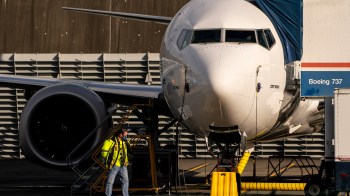How airlines decide where it’s too dangerous to fly
Although the FAA has banned American companies from flying to Israel, potentially dangerous countries like Sudan, Chad, Pakistan and Niger only have warnings.
Michael Boyd, President of Boyd Group International, an aviation industry consulting firm that works with big carriers, says airlines consider many factors when deciding where to fly.
“Airlines don’t make that decision alone,” he says.
Take the case of Malaysian flight MH17, recently shot down over Ukraine. Lots of entities were involved in the decision to let the plane fly there, notes Boyd. Bodies like Eurocontrol – Europe’s answer to air traffic controllers.
“There were over 400 airplanes the prior week that did the same flight – not a problem,” says Boyd. “So there was no strong indication that there was a threat at that point in time.”
And when a route is potentially dangerous Boyd says the U.S. Department of State issues warnings. As a result, passengers don’t want to fly, so airlines cancel flights.
Henry Harteveldt, a travel industry analyst with Atmosphere Research, says the decision about where and when to fly can be much more complex.
“It may be political relationships between the countries. It may be commercial ties between the countries. It may be that while carriers from certain countries are not welcome, carriers from other countries will be welcome,” he says.
If airlines have to fly around problem regions Harteveldt says they have to be sure they can accommodate additional flying time as well as costs for fuel and crew. Like pilots who, he notes, have the right to question the safety of destinations. But if one pilot won’t take a flight, an airline can look for another who will.
“Airlines are commercial businesses – they’re there to earn a profit for their investors, as well as provide safe transportation,” he says.
And safety is what a couple of the big carriers say is their top priority. Like American Airlines – it has canceled upcoming flights to Tel Aviv.
First, says Harteveldt, airlines rely on government authorities, like the FAA, to provide either guidance or edicts on what they should do. They may also rely on other intelligence data that they obtain through private parties like independent companies providing security intelligence. But lastly says Harteveldt, there’s one final resource airlines turn to:
“They use common sense.”
There’s a lot happening in the world. Through it all, Marketplace is here for you.
You rely on Marketplace to break down the world’s events and tell you how it affects you in a fact-based, approachable way. We rely on your financial support to keep making that possible.
Your donation today powers the independent journalism that you rely on. For just $5/month, you can help sustain Marketplace so we can keep reporting on the things that matter to you.


















